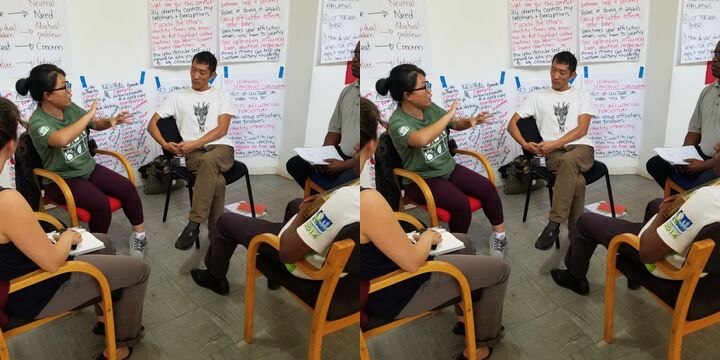CCT Learning Online
The Problem
Globally, conservation conflicts are detrimental to livelihoods, community ways of life, and conservation efforts alike. Social conflicts around conservation issues can erode efforts to protect species and promote shared wins between communities, conservationists, and governments. Furthermore, conservation professionals receive little formal training to strategically navigate social conflicts. There is a need for explicit skills and strategies to build upon people’s implicit understandings of conflict to effectively engage and transform them. COVID-19 is presenting unprecedented challenges to our global society and to the capacity of communities and wildlife to coexist. Widespread, heightened stress and anxiety are increasing rapidly. Such tensions can deeply erode people’s capacity to constructively solve problems, transform conflict, and coexist peacefully – with people and wildlife. During the pandemic, many conservation professionals are unable to engage with communities as they used to or would like. Globally, poaching and other illegal activities are increasing in protected areas as community-benefiting programs and law enforcement have been suspended. Within conservation teams, increased stress is impeding their ability to function constructively. Conservationists need the tools, guidance, and skills to work within their teams and communities in more empathetic, strategic, and transformative ways to effectively address the social conflicts that impact conservation.
Our Proposal
CPeace offers experiential-learning, multi-day workshops designed to build the capacity of diverse people to collaboratively transform destructive conflicts into opportunities to create long-term shared wins. The objective is to improve the ability of participants to analyze conflict dynamics that are created when stakeholders’ needs are not secure and establish more effective skills, processes, and strategies to address these needs collaboratively. Participants accomplish this by learning best practices in Conservation Conflict Transformation that are practical and applicable to deep-rooted conflict realities. As a result, participants ultimately possess a broader set of capabilities to ensure their actions are more strategic, cohesive, and context-appropriate, and are met with higher receptivity and less unintended collateral damage. Given the increased societal stress, conflict, and isolation as a result of the pandemic, we will adapt our capacity building and strategic guidance efforts to an online format. These services will be COVID-19-responsive to help conservation professionals navigate existing and emerging crises. Through innovative adaptation, we will create a new product that is especially needed right now given reduced resiliency of society to bridge social, cultural and political differences. Many of the services will be provided free-of-charge or at reduced cost to ensure those with the most need are able to get support they need during this crisis.
We Assume that...
- we can create an equally high-quality learning experience online, to our in-person CCT workshops.
- demand has been consistently high for attending our CCT in-person workshops and will continue to be high to participate in online workshops.
- some people will be able to pay to attend our online CCT workshops, but some people will not.
Constraints to Overcome
The conservation field largely values biological or technical solutions, rather than recognize the enormous elasticity of the human spirit to adapt and coexist with wildlife once the destructive conflict dynamics are transformed. Other professional trainings in conservation and conflict are less focused on the “how to” of the relational and process dimension of addressing conflict and more focused on agendas that drive people toward problem solving around wildlife. The real obstacle is a lack of process to reconcile the “us vs them” conflicts that prevents stakeholders from working together as genuine partners in conservation. Our primary barriers are lack of time, opportunity, and resources to adapt our in-person capacity building workshops to online platforms. In addition, our in-person learning experiences are incredibly powerful and impactful; it will be a challenge to design the online version to ensure that the same quality of the learning experience will be maintained.
Current Work
Innovating in-person learning to online format: Requiring substantial time, we will divide up the learning from a 5 day in-person workshop into manageable chunks of learning for an effective online approach. We will also expand our materials to be even more applicable to the conditions caused by COVID-19. Content delivery: Utilizing available software such as Zoom, we will test out this learning material through test calls with past workshop participants and staff. Communication: We will need to circulate the availability of these resources to our networks.
Current Needs
Funding: Additional funding could allow us to lower the costs for participants, since our primary costs are for staff time and overhead. Website revision: we would be interested in exploring ways to host videos from the workshops and other online learning resources following the virtual workshops, but are concerned that people will share the information freely.
